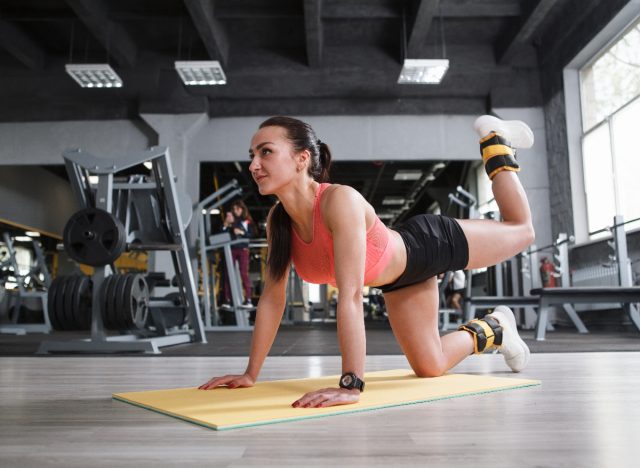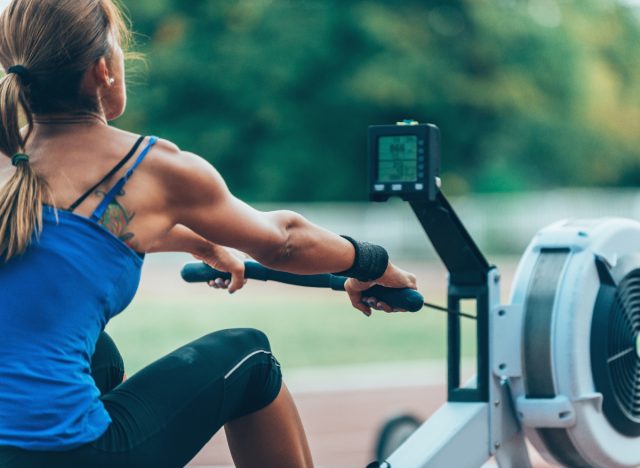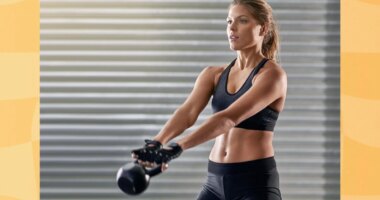Regaining muscle mass becomes more crucial than ever as you grow older. Why? This natural part of aging known as “sarcopenia” begins in your 30s when your muscle function and mass decline, WebMD explains. In addition, being physically inactive means you can part with anywhere from 3% to 5% of your muscle mass every 10 years after hitting 30. That’s why we consulted with an expert who shares five exercises women should avoid to regain muscle. Knowing what you should and shouldn’t spend your time on is key, because time is of the essence!
Tim Liu, CSCS, an online fitness and nutrition coach and a member of our Medical Expert Board who helps individuals burn fat and build muscle without having to spend endless amounts of time at the gym, reveals the exercises women should avoid to regain muscle, along with what exercises to do instead. Keep reading to learn more, and next, don’t miss 5 Strength Exercises That Will Completely Turn Your Fitness Around.
These are the exercises women should avoid to regain muscle.


Don’t waste your time on the following exercises:
Adductor Machine: According to Liu, the adductor machine doesn’t help you build your muscle mass back up. At its very best, this machine should really only be utilized during warm-up sessions.
Crunches and Side Bends: If you’re under the impression that you need to perform countless sets and reps of crunches, side bends, and other ab-focused moves to sculpt a six-pack of muscle, you are mistaken. Liu explains, “[These exercises don’t] build your abs; you should be focusing on exercises that build core stability.”
Box Jumps: The box jump is another exercise that doesn’t build muscle, Liu explains. Think of it more as an “explosive” movement to help boost your athletic capabilities.
Donkey Kicks with Ankle Weights: Ankle weights are stellar pieces of workout equipment, but they have their time and place. You will certainly “feel the burn” while performing the donkey kick in a high rep count, but this exercise doesn’t help sculpt much muscle.
Burpees: If you’re looking for muscle gains, the burpee is an exercise you shouldn’t include in your fitness program. This move is “done more for conditioning than actually for muscle gain,” Liu says.
READ RELATED: A Mom's McDonald's Chicken Nuggets Meal Prep Hack Is Dividing Fans
These are the exercises you should perform instead in order to build muscle mass.


Dumbbell or Barbell Squats: Liu stresses that this is one of the absolute best lower-body moves you can do in order to sculpt lean muscle in your legs. If you opt for dumbbells, hold a weight in each hand by the sides of your body, hinge your hips back, and lower down into a squat before rising back up.
Dumbbell or Barbell Hip Thrusts: This is a stellar move for building strong, toned glute muscles, and it’s “way better than donkey kicks or any timed movement involving bands,” Liu says. To perform it, you’ll situate your upper back on a workout bench, plant your feet on the floor, and have a dumbbell or barbell resting in your hands on your lap. Descend your hips toward the floor, then push yourself back up.
Bulgarian Split Squats: The Bulgarian split squat is awesome for working on your quads, glutes, and inner thighs. Liu dubs it “one of the best single-leg movements you can do.” In order to perform this exercise, you’ll need a workout bench, couch, or another sturdy surface to elevate your back foot on. Hold a dumbbell in each hand, and descend into a split squat. Then, rise back up.
Seated Row: Next up, we have a seated row, which will activate your lats and upper back muscles. “The constant tension from the cable will help you feel your muscles engage the entire time,” Liu says.
Dumbbell Bench Press: Last but not least, if you want to regain muscle, include dumbbell bench presses in your workout. This exercise helps build up your muscle supply in your triceps and chest. To set up, lie flat on a workout bench with a dumbbell in each hand. Keep the weights by your hips before pressing them up (with your palms facing away from your face), fully extending your arms.
Alexa Mellardo
Source:











